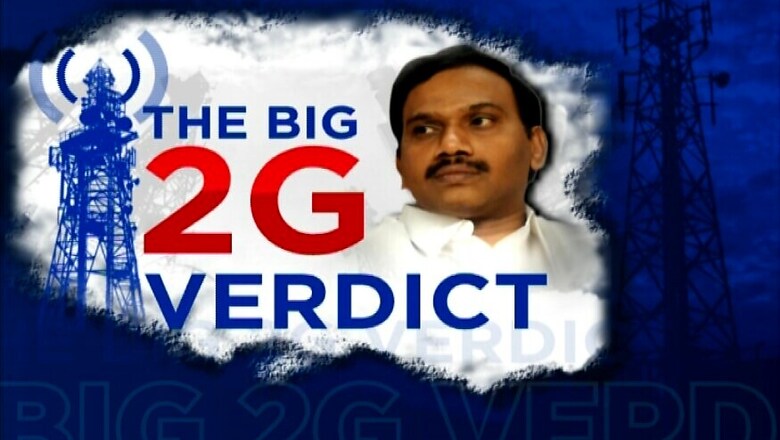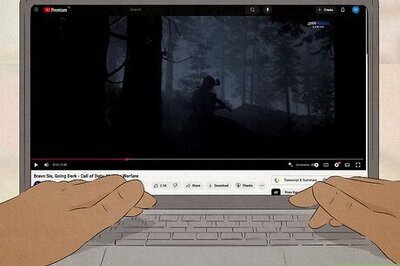
views
The Central Bureau of Investigation (CBI) court in New Delhi on Thursday pronounced its verdict in the Rs 1.76-lakh-crore 2G spectrum allocation scam of 2008 where it acquitted all of the accused.
So what was the whole controversy about. Here is all you need to know about the case:
What is the case all about?
The 2G scam is about the alleged irregularities in the allocation of second generation (2G) spectrum in 2008, when Unified Access Services (UAS) licences were issued on a first come, first served (FCFS) basis at a price arrived at in 2001. In its 80,000-page chargesheet, filed in April 2011, the CBI alleged the exchequer had suffered a loss of Rs 30,984 crore in the allocation of 122 licences for 2G spectrum.
Who all were the accused?
The main accused in the 2G case was the then Telecom Minister in the UPA regime A Raja. The other accused was DMK leader and Rajya Sabha MP, Kanimozhi.
Among the businessmen under judicial radar were Swan Telecom and DB Group promoters Shahid Usman Balwa and Vinod Goenka, Unitech Ltd Managing Director D Sanjay Chandra, Reliance Anil Dhirubhai Ambani Group executives Gautam Doshi, Surendra Pipara and Hari Nair.
The other accused in the case were Directors of Kusegaon Fruits and Vegetables Pvt Ltd Asif Balwa and Rajiv Agarwal, Kalaignar TV Director Sharad Kumar and Bollywood producer Karim Morani.
The three companies - Reliance Telecom Ltd, Swan Telecom Pvt Ltd and Unitech Wireless (Tamil Nadu) Pvt Ltd – were also named in the case.
What were the main allegations?
The case centred around five main allegations: fixation of an arbitrary cut-off date; violation of FCFS policy in issuing Letters of Intent (LoIs); granting of UAS licences to two ineligible companies; cheating the exchequer by non-revision of entry fee; and payment of Rs 200 crore bribe to Kalaignar TV Pvt Ltd, promoted by the family of DMK patriarch M Karunanidhi.
What did the court hold today?
A special CBI court acquitted all the 19 accused in the 2G spectrum allocation scam case on Thursday. Judge OP Saini in a verdict running over 1,500 pages said that the former Telecom Minister and DMK leader A Raja was not the ‘mother lode of conspiracy’ and the quality of the “prosecution totally deteriorated and became directionless” towards the end.
Is Judge Saini's verdict contradicting the SC verdict of 2012?
This verdict by Judge Saini also raises questions the SC verdict delivered in February, 2012, where it cancelled 122 2G licences granted by former Telecom Minister A Raja in January 2008 on first-come, first-served basis. The apex court held that licences for 2G spectrum were granted in arbitrary and unconstitutional manner.
The Supreme Court in 2012 through Justices GS Singhvi and AK Ganguly, held that spectrum was a natural resource, said natural resources “are vested with the government as a matter of trust in the name of the people of India, and it is the solemn duty of the state to protect the national interest, and natural resources must always be used in the interests of the country and not private interests.”
The apex court further declared that the allocation of 2G spectrum by the Congress-led United Progressive Alliance (UPA) government was “illegal” and an example of the arbitrary exercise of power.
However, not to forget this trial was a Supreme Court-monitored probe. One of the questions before the SC was whether the policy of first-come, first-served followed by DoT for grant of licences is ultra vires the provisions of article 14 of the constitution and whether the said policy was arbitrarily changed by the A. Raja without consulting TRAI, with a view to favour some of the applicants?
The SC bench said that there was a fundamental flaw in the first-come, first-served principle, inasmuch as it “involves an element of pure chance or accident.”
In matters involving award of contracts or grant of licence or permission to use public property, the invocation of first-come, first-served policy has inherently dangerous implications,” said the SC in 2012.
SC had also noted that "the exercise undertaken by the officers of DoT between September 2007 and March 2008, under the leadership of A Raja was wholly arbitrary, capricious and contrary to public interest apart from being violative of the doctrine of equality".
But now Judge OP Saini in today's verdict states that “there is no material on record to show that Raja was mother lode of conspiracy in the instant case. There is also no evidence of his no-holds-barred immersion in any wrongdoing, conspiracy or corruption. I have no hesitation in holding that record is not sufficient and the prosecution has miserably failed in proving charges. All accused are acquitted.”
The court has also raised questions on the charge sheet filed by the CBI and called the facts recorded therein "factually incorrect." The CBI had filed 80,000 pages of charge sheet which was brought in several trunks to the court when the trial had commenced.
Was there a scam at all?
No. If only today's verdict is read in toto, then the way all the accused have been acquitted shows that there is no scam.
In fact, the court has stated in the verdict that this was no scam, but only a result of public speculation.
The judge has said that 2G scam was all about "public perception, created by rumour, gossip and speculation" and that these can't be relied in judicial proceedings.
"A huge scam was seen by everyone when there was none. These factors compelled people to conjecture about a big scam. Thus, some people created a scam by artfully arranging a few selected facts and exaggerating things beyond recognition to astronomical levels," said the CBI Judge Saini in Thursday's verdict.
Judge Saini has also squarely blamed the haphazardly scattered documents as the reason behind the "suspicion of grave wrongdoing."
"When documents are not traceable easily and readily and policy issues are scattered haphazardly in so many files, it becomes difficult for anyone to understand the issues. Non-understanding of issues in proper perspective led to a suspicion of grave wrongdoing, where there was none, at least as per record of the court," notes Judge Saini.
Why does the court say that the prosecution has failed to establish a case?
Judge OP Saini acquitting all the accused in the 2G scam case has again trained the spotlight on the Central Investigating agency and how it became "directionless and diffident" in this case.
The judge also noted that “in the beginning, the prosecution started with the case with great enthusiasm and ardour. However, as the case progressed, it became highly cautious and guarded in its attitude making it difficult to find out as to what prosecution wanted to prove. The quality of prosecution totally deteriorated and it became directionless and diffident,” reads the CBI court verdict.
Saini had some harsh words for the CBI while stating on how the prosecution did not come up with even one single legally admissible evidence.
"I religiously sat in open court for the last 7 years from 10 am to 5 pm even during summer vacation awaiting for someone with legally admissible evidence. Not a single soul turned up," reads the verdict.
The prosecution had argued that DoT officials allegedly leaked to some applicants the date of issuance of the LoI (October 10, 2008). In the letter, an arbitrary condition, that whoever deposited the fees first would get the licence first, was incorporated. Applicants who had this information in advance (including Swan and Unitech) were able to deposit the fee before others. The FCFS principle was subverted, said the prosecution.
However, Judge Saini has now stated that the "prosecution has failed to prove the case miserably." He holds that the chargesheet of the instant case is based mainly on misreading, selective reading, non¬reading and out of context reading of the official record".
The special CBI judge also questions the kind of evidence submitted by the prosecution and says that “there is no evidence on the record produced before the Court indicating any criminality in the acts allegedly committed by the accused persons relating to fixation of cut¬off date, manipulation of first-come, first-served policy”.
What happens now and will there be an appeal?
The CBI said that it would file an appeal against the 2G scam case verdict by a special court, which acquitted all the 16 accused rejecting the case presented by the agency.
The agency declared within hours of the verdict that "it has been prima facie examined". "The judgement relating to the 2G scam case of today has been prima facie examined and it appears that the evidence adduced to substantiate the charges by the prosecution has not been appreciated in its proper perspective by the learned court. The CBI will be taking necessary legal remedies in the matter," CBI spokesperson Abhishek Dayal said.
The Enforcement Directorate (ED) has also decided to appeal against the judgment of the special court that acquitted 19 people in the 2G spectrum allocation money laundering case.
















Comments
0 comment